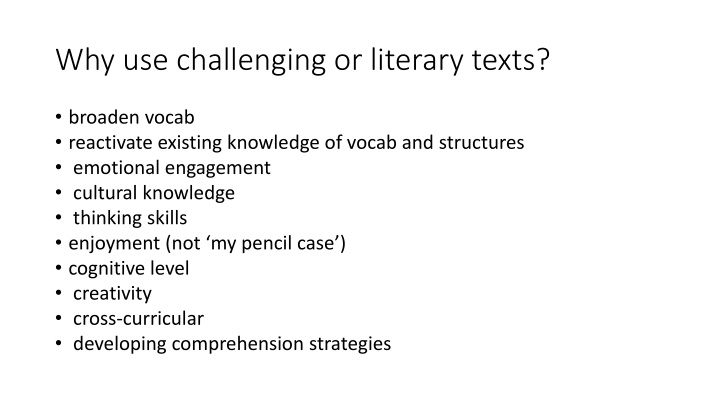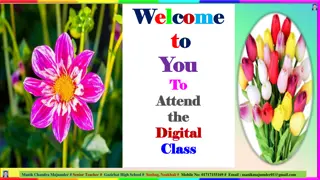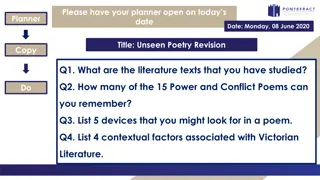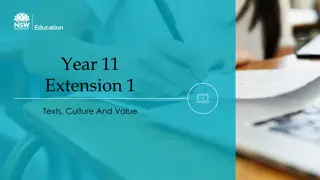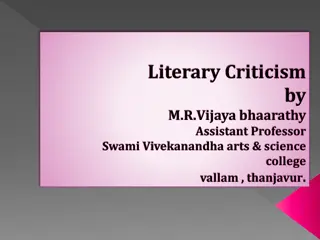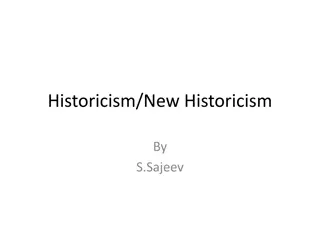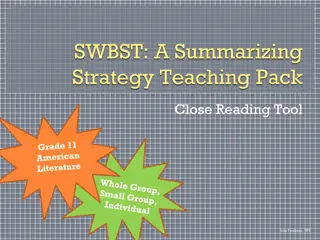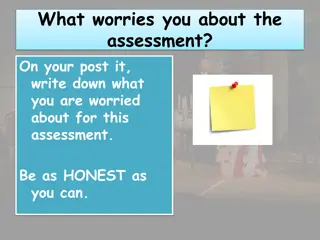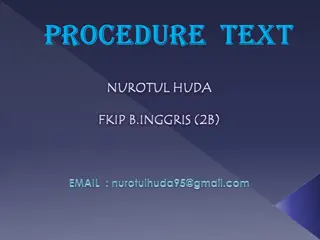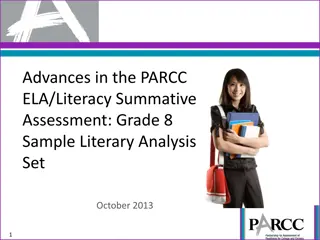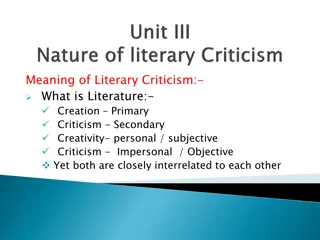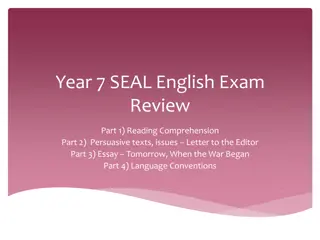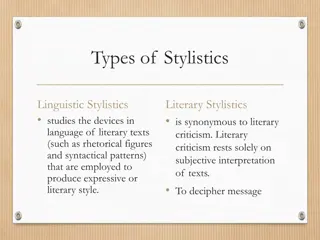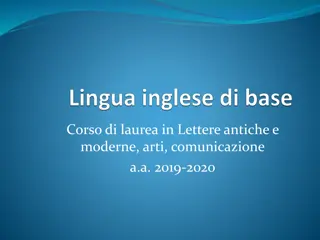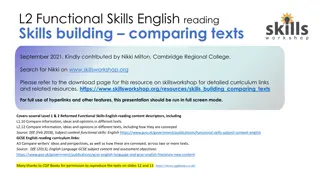Enhancing Language Skills Through Challenging Literary Texts
Broaden vocabulary, reactivate knowledge, and engage emotionally with challenging literary texts to develop comprehension strategies, cultural awareness, and cognitive skills. Utilize various media sources and explicit instruction to access more complex texts, fostering creativity and cross-curricular connections.
Download Presentation

Please find below an Image/Link to download the presentation.
The content on the website is provided AS IS for your information and personal use only. It may not be sold, licensed, or shared on other websites without obtaining consent from the author.If you encounter any issues during the download, it is possible that the publisher has removed the file from their server.
You are allowed to download the files provided on this website for personal or commercial use, subject to the condition that they are used lawfully. All files are the property of their respective owners.
The content on the website is provided AS IS for your information and personal use only. It may not be sold, licensed, or shared on other websites without obtaining consent from the author.
E N D
Presentation Transcript
Why use challenging or literary texts? broaden vocab reactivate existing knowledge of vocab and structures emotional engagement cultural knowledge thinking skills enjoyment (not my pencil case ) cognitive level creativity cross-curricular developing comprehension strategies
Principle 5 READING AND LISTENING Learners need to be taught how to access a greater range of more challenging spoken and written texts, through explicit instruction in comprehension strategies and in the relationship between the written and spoken forms.
Aims Aims Develop phonological decoding Engaging with and appreciating authentic sources Learn about German speaking cultures broadening horizons Developing strategic reading for comprehending challenging material Expanding vocab and grammatical knowledge lower frequency items Reflect on the nature of translation; develop skill in translating Develop English literacy? Liaise with English department? History? Music??
Choosing texts Short Extracts? Songs? Poems? Topics Interest and accessibility. Media Wanted to make use of a variety of media to give students a way in. Youtube was crucial. Hard but engaging text vs easy but boring text. Personal preference and choice quite important.
Series of about 6 lessons Classwork where we explored Rilke s der Panther in a variety of ways. Pre-activating knowledge of text forms (letter, poem etc) Pre-activating vocabulary and topic knowledge by watching performance of poem with music. Target language discussion. Wie ist die Atmosph re? Wie ist der Rhythmus? If this poem were about an animal, what kind of animal could it be? Why? Focussing on decoding of key sounds in the poem. The poem form fitted really well with this for example the assonance used in the poem, really focussed on the tricky sound and listening to the performance really highlighted that sound. Reading with reading strategies and using the knowledge they have already gained to pick out key words / phrases they understand. Supporting with google translate, or rough translations. Showing the difficulties of using google, but also the skills needed to work with google effectively (and the art of translation).
Instrumente Rhythmus Ton / Atmosph re Farben Licht Sonstiges (other)
K se St/sp Stop sport Z Zoo Atmosph re Ei Kein mein ie V vier Spielen wie
Hausaufgaben fr Mittwoch 26. November W hle eine eine Aufgabe: 1) Research the poet Rainer Maria Rilke and find out what he was famous for. Bring in your notes (no copying and pasteting). Can be in English. 2) Record yourself saying the poem paying attention to tone and pronunciation. Use the sound banks to help you. Email it to: cwil0109@bartholomew.oxon.sch.uk Choose a task and complete for homework. 3) Write out a neat version of Der Panther by hand (for display) and illustrate it to match the mood and message of the poem. 4) Create your own German poem about an animal of your choice. German words rhyme quite easily but you could use http://www.d-rhyme.de/ to help. 2) Find a poem about an animal (can be any language) and compare it to der Panther . Which do you prefer (in German)? Ich finde der Panther besser/nicht so gut, weil .. Der Panther ist w hrend (name of other poem) ist. Der Panther is . whereas .. is .
and stops to be in the heart. in which numbed a big will stands. Only sometimes pushes the curtain of the pupil itself silently open then goes a picture in His view is from the going past of bars so tired become, that it nothing more holds. it is, as if there were thousand bars and behind thousand bars no world. The soft pace smooth strong steps which itself in smallest circle turns, is like a dance of strength around a middle, goes through the limbs tense stillness
Die Stimmung/Atmosphre ist. The mood/atmosphere of the poem is . Ich finde das Gedicht . I find the poem . Ich denke der Dichter m chte sagen, dass .. I think the poet would like to say that . Das Gedicht handelt von . The poem is about . Ein wichtiges Wort im Gedicht ist . weil .. An important word in the poem is .because Meine Lieblingsinterpretation ist .weil My favourite interpretation of the poem is because . Ein wichtiger Satz im Gedicht ist . weil An important line in the poem is .because stimmungsvoll traurig stolz frustriert effektiv der K fig einsam er langweilt sich verschwendetes Potential eingeschr nkt die Kraft m de rhythmisch langsam Beindruckend der Ton
Finde die Gegenstze: Zum Beispiel: Warm Kalt traurig laut langsam romantisch modern nachdenklich froh k hl ruhig schnell altmodisch krass
Exploring Lili Marlen song in similar ways but also applying a historical context. Instrumente? Ton? Atmosph re? Alter?
Ich verstehe nicht I dont understand Was f r..? What kind of Was heisst .? What does . mean? Wie sagt man ? How do you say .? Was f r ein Text ist das? Wie ist die Atmosph re? Wie f hlt sich der S nger / die S ngerin? Wie alt ist das Lied? Warum denkst du das? Was f r ein Lied ist das? Warum existiert es?
For this reading exercise I. 1. looked at any pictures, read any titles or instructions, identified type of text e.g. email/poem etc. 2. thought of any words or phrases I might read 3. looked for words I already know 4. tried to pick out cognates or near cognates 5. tried to work out a word by using the words around it i.e. using the context 6. asked myself if the meaning of the word fits in the context. 7. Looked for words which have something in common with the point of the text. 8. looked at longer words to see if I could break them down to work out their meaning 9. used my general knowledge to think about what the unknown word might logically mean 10.used what I know about sentence structure to work out what kind of a word it is (noun/adjective/verb)
https://www.youtube.com/watch?v=j47THUNGuIY https://www.youtube.com/watch?v=XM0dseNtaVI&list=PLe5k https://www.youtube.com/watch?v=XM0dseNtaVI&list=PLe5k 6mlATGr211OAiZahSNXquDwI7HrdT 6mlATGr211OAiZahSNXquDwI7HrdT Lili Marleen Vor der Kaserne Vor dem gro en Tor Stand eine Laterne Und steht sie noch davor So woll'n wir uns da wieder seh'n Bei der Laterne wollen wir steh'n Wie einst Lili Marleen. Deine Schritte kennt sie, Deinen zieren Gang Alle Abend brennt sie, Doch mich verga sie lang Und sollte mir ein Leid gescheh'n Wer wird bei der Laterne stehen Mit dir Lili Marleen? Unsere beide Schatten Sah'n wie einer aus Da wir so lieb uns hatten Das sah man gleich daraus Und alle Leute soll'n es seh'n Wenn wir bei der Laterne steh'n Wie einst Lili Marleen. https://www.youtube.com/watch?v=bUsePoATbrUt
1. 2. 3. 4. 5. 6. 7. 8. 9. 10. Ich verstehe nicht 11. Wie sagt man ? 12. Was hei t..? 13. die Laterne 14. der Krieg 15. die Soldaten das Gedicht der Brief das Lied die Farben traurig laut der Ton langsam altmodisch 14. das Tier 15. das Schlagzeug 16. die Geige 17. die Strophe 18. einsam 19. unwohl 20. m de 21. die Angst Examples of the kind of vocabulary students were noting down and coming across repeatedly during the course of the lessons. Not particularly obscure.
Finally students had an assessment lesson where they applied the skills independently to a third poem, der Pflaumenbaum, by Berthold Brecht.
Some student responses: I m really pleased with my translation actually. I think it s quite good! I really enjoyed that! When can we go back to doing real German? Really depends on the student. Some students seem to prefer the creativity of it. They like the arty-ness of it. They can engage with the feelings and the topics. There were about 7 students in the class that responded particularly well, almost as if this was the first real challenge they were having (despite being in a top set class). Some students clearly felt out of their comfort zone. First lesson was a novelty, second lesson was a slog and then by the end they were more comfortable with and eager to show what they knew, or at least test themselves and get some feedback.
Decoding focus 1) Looking at der Panther we talked through some key sounds, using well known words as a starting point. 2) Students looked at der Panther and in pairs identified where these key sounds appeared in the text. They then practised reading these in pairs. 3) Students had already heard the performance, which at this stage proved really useful as they heard the assonance and rhymes and noticed these more than in a normal text. 4) We did some group reading and peer assessment. 5) Students worked individually to practise reading der Plaumenbaum and I recorded them. The only help they had was the previous lesson input and a reminder of the key sounds on the board. 6) Evaluation: Students still made mistakes in pronunciation, but on sounds we hadn t focussed on. Students were very accurate on the sounds we have practised and which they were told to focus on. Listen to examples.
K se St/sp Stop sport Z Zoo Atmosph re Ei Kein mein ie V vier Spielen wie
O/or Tor! Eh gehe Ah Jahre Ch ich W wie
